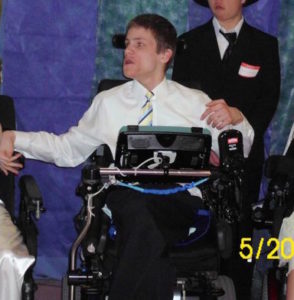20 May 2018 — SpeakUp Editor
USSAAC’s members are diverse and include augmentative and alternative communication (AAC) researchers, device manufacturers, therapists, teachers, families of individuals using AAC, and people who use AAC. SpeakUP strives to be “The Voice of AAC” by including posts by all stakeholders, including individuals who use AAC. Today we are pleased to welcome Mike Hipple, USSAAC’s Director of Membership, to share his firsthand perspective about growing up using AAC. He also offers his sage advice to other AAC families about the importance of building an AAC community.
—–
Before I got a device, I communicated through my behaviors and a lot of yes and no questions. I also used pictures to communicate with. It was so frustrating to have ideas and thoughts for my family and friends to hear and didn’t have a way of communicating them.

But now I want to go back to 2001—the year that I got my first communication device. At first my parents and my school team told me that I needed a communication device. I remember thinking that I could communicate fine and I felt embarrassed and lonely having a communication device.
I was the first student who used a communication device in the school district, so my family and my IEP team were learning about how to help a first grader use his communication device. They didn’t get to watch and learn from webinars, blogs, or Facebook groups.
Throughout the early years I was feeling lonely, frustrated, and mad at God, because I didn’t understand why I couldn’t speak. I questioned my life in second and third grades. Why was I living without being able to talk? I prayed this prayer: God, please show me why you made me this way, then I will help families and children who are in the same boat. About a month later a newspaper story came out about a man with cerebral palsy who used a communication device. He was running a camp for teenagers who use AAC in Whitewater, WI. Later that year, my aide and my case manager were watching 20/20 and they saw a family from New York, NY. The family had a son who was nonverbal and they started an inclusive kindergarten class. All of a sudden, I knew of two people who used AAC, so I started using my own communication device more and more. My AAC specialist went to the Closing The Gap conference and learned more about AAC and how to support me.
I didn’t meet my first adult AAC communicators until I was 12 when I went to the AAC camp in Whitewater. When I met my first adults who use a communication device it was a life saver, but at the age of 16, going to the Pittsburgh Employment Conference was a game changer. I heard a lot of amazing stories and met some great people that are still my friends.
I began my AAC journey in first grade, but in 100 years couldn’t see myself doing half of the things that I am now part of. I also couldn’t imagine all the friends I would meet along the way. I just went to my state Autism Society conference and was surprised by how many families came to learn new things to help their children. For parents who are reading this, please go to a conference, join Facebook groups for AAC and your child’s specific disability, follow professionals on social media, and join groups like USSAAC and your state disability groups and societies. You will learn from them and hopefully you will feel part of the community. Our AAC community is full of amazing, nice, and good people. I have been so lucky to be part of this community for 12 years. I eat and live for AAC to give others a voice just as I have been given. Without some type of AAC many people with disabilities would have trouble communicating the most basic need. Imagine not be able to tell your care-giver what you want to eat or even where you are in pain.
I hope I will meet your family at a conference in the future. Just look for a man in a power chair with USSAAC buttons all over!!
Editor’s Note: People who use AAC and their families can join USSAAC for only $40 CAD a year! Visit https://ussaac.org/membership/ for more information.
—–
Mike is from Appleton Wisconsin and he is working to give others a voice. Just as his mentors Sharon, Jen, and Stacy, two speech therapists and a physical therapist respectively, helped Mike with his communication through AAC, Mike strives to help and work with people who have communication challenges. Mike started the Wisconsin AAC network to address the lack of support for families and individuals in Wisconsin using AAC.
—–
Jill E Senner, PhD, CCC-SLP
SpeakUP
Editor-in-Chief
